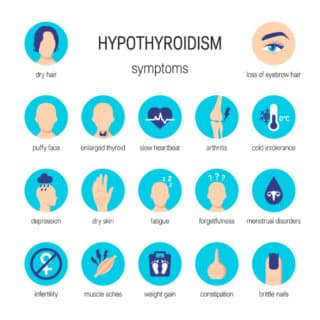
BeBalanced Hormone Weight Loss Centers – Annapolis
1667 Crofton Center
Suite 8A
Crofton, MD 21114

More Weight Control, Nutrition & Exercise Articles
Thyroid and Weight – What’s the Connection?

The thyroid is a butterfly-shaped gland in the front of your neck that produces thyroid hormones. Thyroid hormones control the way your body uses energy and affect nearly every organ in your body. If your thyroid is underactive, not producing the right amount of thyroid hormones, it is known as a condition called hypothyroidism. Nearly 15 million Americans have hypothyroidism. However, up to 60% of those with a thyroid disorder are completely unaware of it.
When you have hypothyroidism, your metabolism (among other functions within the body) will be slower than average. Metabolism is how fast your cells turn nutrients into energy. The slower the process, the fewer calories you burn at rest and during activity. With a slow metabolism, more stored calories turn to fat tissue, leading to weight gain that can increase over time.
Other symptoms of hypothyroidism besides weight gain, other symptoms of hypothyroidism include:
- The inability to lose weight
- Increased sensitivity to the cold
- Fatigue
- Depression
- Dry skin, hair and nails
- Hair loss
- Muscle weakness and joint pain
- Menstrual problems
- Infertility
- Brain fog
- Low stress resistance
- Recurrent infections
As you can imagine, symptoms like joint pain, fatigue, and depression could be exasperating weight gain, leading to a vicious cycle. When you’re exhausted, in pain, or feeling down you are less likely to get physical exercise, stick to a healthy diet, or practice self-care.
What causes thyroid dysfunction?
Research estimates that up to 90 percent of all cases of hypothyroidism are autoimmune in nature, with the most common result being Hashimoto’s disease. When this happens, your thyroid is not the source of the problem but the victim of a misguided immune system attack in which your body mistakes your thyroid for a virus.
Other causes include:
- Radioactive iodine (used to treat hyperthyroidism)
- Chronic stress – Cortisol can inhibit or block proper thyroid hormone conversion, leaving you “thyroid resistant.”
- Certain medications (like lithium)
- Inflammation
- Estrogen dominance
Reverse hypothyroidism weight gain naturally
We have found that when insulin and cortisol levels are balanced through specific diet and lifestyle changes, while balancing sex hormones, the thyroid gland becomes much more efficient, lessening and even eliminating the need for medications.
Not only can this combination help you lose weight, but it will help you:
- reduce stress and inflammation,
- strengthen your immune system,
- and improve symptoms related to hypothyroidism such as depression, fatigue, hair loss, brain fog, and more!
If you suffer from thyroid dysfunction, or other hormone related issues, BeBalanced can help!
Other Articles You May Find of Interest...
- Ten Lifestyle Habits and Practices for a Healthier Family
- When to Reach Out for Support: Navigating Food Fears with the Help of an Eating Disorder Dietitian
- Five Reasons to run a marathon: Get your trainers on…
- MAY MARKS CELIAC AWARENESS MONTH
- Lifestyle Changes To Lower Cholesterol
- Let’s Get Physical: Making Physical Activity a Part Of Your Family Life
- Bariatric Surgery and Sleep Apnea

















